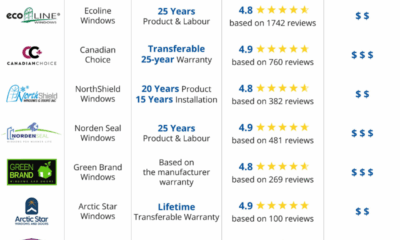Business
Essential Condo Buying Questions Answered for Manitoba Buyers

As interest in condo ownership rises in Manitoba, prospective buyers are increasingly seeking clarity on various aspects of the process. Questions about condo fees, insurance, and buyer rights are prevalent, especially among first-time buyers. Addressing these concerns, Tracy Mainland Kramble, a realtor with RE/MAX Associates, provides essential insights into the most common queries that buyers face.
Understanding Condo Fees and Their Purpose
A frequent question among buyers is, “What exactly do my condo fees pay for?” In the Winnipeg area, monthly condo fees serve as a shared savings plan. These fees typically cover operational costs such as snow clearing, lawn maintenance, common-area lighting, and elevator upkeep. Additionally, they contribute to the building’s master insurance policy and the reserve fund, which is crucial for major repairs like roof replacements and boiler upgrades.
While the overall cost of the fee is important, the allocation of those funds is even more critical. An unusually low fee could indicate an underfunded reserve, potentially leading to special assessments in the future. Buyers should scrutinize how the fees are allocated before making a commitment.
Mandatory Reserve Fund Studies and Buyer Protections
Another vital aspect of condo ownership in Manitoba is the requirement for a reserve fund study every five years, as stipulated by the Condominium Act. This study, conducted by a qualified engineer or architect, estimates upcoming major repair costs and recommends necessary reserve fund levels. Regular updates ensure that all owners contribute fairly to potential future expenses.
Prospective buyers should request to review the latest reserve fund study to understand the financial health of the condo corporation before finalizing their purchase.
Additionally, Manitoba law provides a “cooling-off period” of seven days after receiving a complete disclosure package, which includes essential documents such as the condo declaration and insurance certificate. During this time, buyers can withdraw from the agreement for any reason, ensuring they have adequate time to review the details. If there are concerns regarding the reserve fund or other restrictions, cancellation is an option with the return of the deposit.
Insurance Coverage and Special Assessments Explained
Insurance coverage often leads to confusion among buyers. In Manitoba, the condo corporation’s insurance covers the building’s structure and common areas, but individual unit owners must obtain their own insurance. A Condominium Unit-Owner Policy is necessary to protect personal belongings and upgrades, as well as provide liability coverage. Local insurance brokers can assist buyers in obtaining the right policy, typically costing between $25 and $40 per month.
A related concern is the potential for special assessments. These one-time fees are imposed when the reserve fund lacks sufficient funds to cover unexpected major expenses. Buyers should thoroughly review recent annual general meeting minutes and the reserve fund study to identify any planned projects or financial shortfalls that might result in additional charges.
Purchasing a condo can be an excellent entry point into the housing market, particularly for those seeking a low-maintenance lifestyle. By asking pertinent questions and understanding their rights under Manitoba’s laws, buyers can navigate the process with confidence. Tracy Mainland Kramble encourages prospective owners to gather all necessary information to make informed decisions.
This article is intended solely for informational purposes and does not replace legal advice. Buyers are advised to consult with a lawyer regarding real estate transactions.
-

 World3 months ago
World3 months agoScientists Unearth Ancient Antarctic Ice to Unlock Climate Secrets
-

 Entertainment3 months ago
Entertainment3 months agoTrump and McCormick to Announce $70 Billion Energy Investments
-

 Lifestyle3 months ago
Lifestyle3 months agoTransLink Launches Food Truck Program to Boost Revenue in Vancouver
-

 Science3 months ago
Science3 months agoFour Astronauts Return to Earth After International Space Station Mission
-

 Technology2 months ago
Technology2 months agoApple Notes Enhances Functionality with Markdown Support in macOS 26
-

 Top Stories1 week ago
Top Stories1 week agoUrgent Update: Fatal Crash on Highway 99 Claims Life of Pitt Meadows Man
-

 Sports3 months ago
Sports3 months agoSearch Underway for Missing Hunter Amid Hokkaido Bear Emergency
-

 Politics2 months ago
Politics2 months agoUkrainian Tennis Star Elina Svitolina Faces Death Threats Online
-

 Technology3 months ago
Technology3 months agoFrosthaven Launches Early Access on July 31, 2025
-

 Politics3 months ago
Politics3 months agoCarney Engages First Nations Leaders at Development Law Summit
-

 Entertainment3 months ago
Entertainment3 months agoCalgary Theatre Troupe Revives Magic at Winnipeg Fringe Festival
-

 Politics1 week ago
Politics1 week agoShutdown Reflects Democratic Struggles Amid Economic Concerns





















